Asia-Pacific Economic Cooperation (APEC)
The 2018 APEC Economic Leaders' Meeting in Papua New Guinea
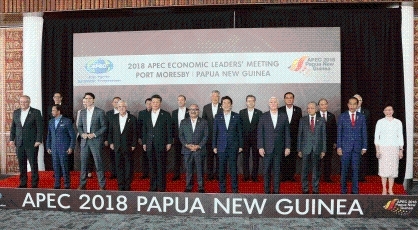 Photograph of the leaders’ commemorative photograph session
Photograph of the leaders’ commemorative photograph session(Photo: Cabinet Public Relations Office)
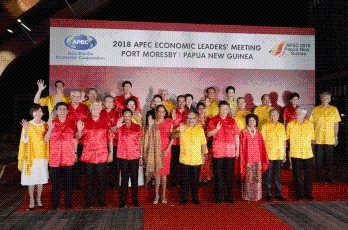 Photograph of the Prime Minister attending the gala dinner
Photograph of the Prime Minister attending the gala dinner and commemorative photograph session
(Photo: Cabinet Public Relations Office)
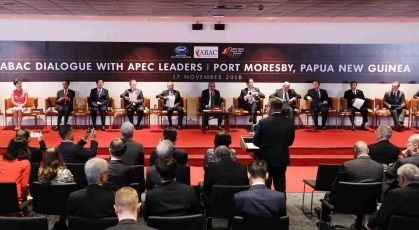 Photograph of the ABAC Dialogue with APEC Leaders
Photograph of the ABAC Dialogue with APEC Leaders
(Photo: Cabinet Public Relations Office)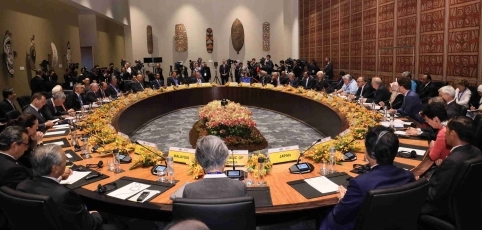 Photograph of the APEC Leaders' Dialogue with Pacific Island Leaders
Photograph of the APEC Leaders' Dialogue with Pacific Island Leaders
(Photo: Cabinet Public Relations Office)
The APEC Economic Leaders' Meeting was held in Port Moresby, Papua New Guinea on November 17 and 18, under the chairmanship of the Hon. Peter O'Neill, Prime Minister of the Independent State of Papua New Guinea. Prime Minister of Japan Shinzo Abe attended the meeting.
1. Schedule
| November 17, Afternoon |
|
| November 18, Morning |
|
| November 18, Afternoon |
|
2. Retreat "Connecting for Inclusive Growth through Digital Future"
- (1) Discussions took place regarding the APEC roadmap toward a digital economy, regional economic integration, the Free Trade Area of the Asia-Pacific (FTAAP), progress towards the Bogor Goals, the APEC post-2020 vision, ways for establishing participation by Small and Medium Enterprises (SMEs) in Global Value Chains, and other topics.
- (2) Prime Minister Abe' s main comments:
- Even amid the declining population, Japan will take firm action to address the problem of population decline itself, while improving its potential growth rate.
- The Asia-Pacific region, which has enjoyed prosperity through the liberalization of trade and investment and through enhanced connectivity in accordance with international rules, is the core of the free and open Indo-Pacific.
- Japan will chair the G20 next year, and as a member both of APEC and the G20, Japan will play a leading role so that the Asia-Pacific region will develop and continue to be the world' s growth center.
- As the champion of free trade, Japan will advance free and fair rules in all fora including multilateral, regional, and bilateral fora, and will firmly work on reform of the World Trade Organization (WTO), which is the cornerstone of the multilateral trade system.
- TPP11, of which we are able to present an entry into force at the end of this year, can be the foundation for trade and investment rules in the 21st century. TPP11 and RCEP will pave the way for the eventual realization of FTAAP.
- For infrastructure investment, it is necessary to ensure international standards such as open access, transparency, economic efficiency, and fiscal soundness, in order to create a win-win relationship for both the investor countries and the recipient countries.
3. ABAC Dialogue
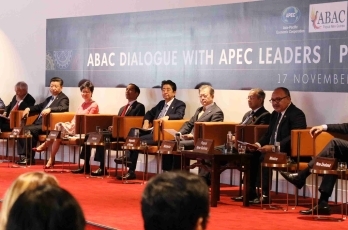 Photograph of the ABAC Dialogue with APEC Leaders
Photograph of the ABAC Dialogue with APEC Leaders
(Photo: Cabinet Public Relations Office)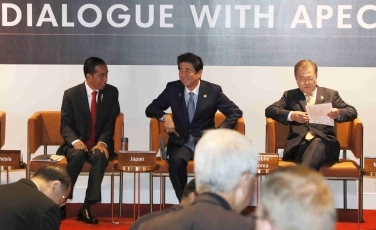 Photograph of the ABAC Dialogue with APEC Leaders
Photograph of the ABAC Dialogue with APEC Leaders
(Photo: Cabinet Public Relations Office)
A discussion was held between APEC Leaders and ABAC members from each economy. In response to questions from ABAC members, Prime Minister Abe stated that in addition to the importance of WTO reform, efforts would be made to incorporate high level rules and addressing of unfair trade practices in regional and bilateral initiatives, including TPP11, of which we are able to present an entry into force at the end of this year, and the Japan-EU Economic Partnership Agreement (EPA). Prime Minister Abe additionally introduced Japan' s initiatives for the Fourth Industrial Revolution, e-commerce, and preventative medicine.
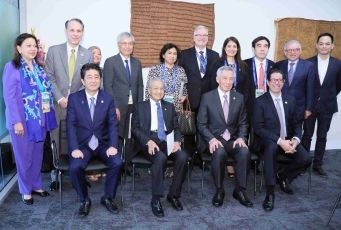 Photograph of the ABAC Dialogue with APEC Leaders
Photograph of the ABAC Dialogue with APEC Leaders
(Photo: Cabinet Public Relations Office)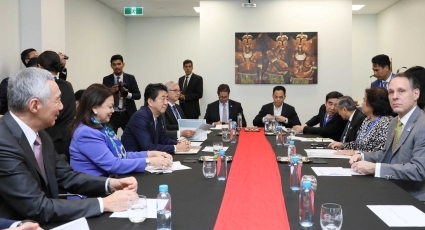 Photograph of the ABAC Dialogue with APEC Leaders
Photograph of the ABAC Dialogue with APEC Leaders
(Photo: Cabinet Public Relations Office)
4. Further Plans
Chile is planned to host APEC next year (2019).

